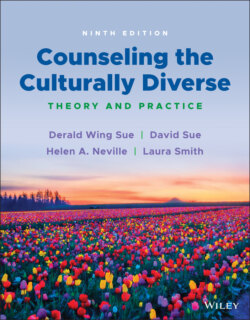Читать книгу Counseling the Culturally Diverse - Laura Smith L. - Страница 33
CULTURAL COMPETENCE AND EMOTIONS
ОглавлениеThere are many other powerful emotions often experienced by students during the journey to developing cultural competence. They include sadness, disappointment, humiliation, blame, invalidation, and so on. These feelings, along with those already discussed, can make their appearance in dialogues on multiculturalism or diversity.
The unpleasantness of some emotions and their potentially disturbing meanings makes for avoidance of honest multicultural dialogues and hence a blockage of the learning process. Rather than seeing emotions as a hindrance and barrier to mutual understanding, and rather than shutting them down, allowing them to bubble to the surface actually frees the mind and body to achieve understanding and insight. The cathartic relationship between memories, fears, stereotypic images, and the emotional release of feelings is captured in the following passage, which describes the racial awakening of Reese, a White male social justice advocate.
I remember when I was first introduced to [intergroup dialogue] … I thought it was the most bullshit pedagogy … And, I fought it so hard … I don't know why I would ever sign up for another course … I really thought it was stupid … [L]ike the taking in a circle with the whole dialogue pedagogy was a huge hang‐up … [Later, reading about Friere] was a really important moment in my life when I think about development. (Ford, 2017, p. 124)
Years after his work as an intergroup dialogue facilitator, Reese reflected that the experience had a “big impact” on his development and influenced his “perspectives.” He also recognized that his journey was influenced by his varying levels of racial awareness as a White male along the way.
We are aware that the content of this chapter has probably already pushed hot emotional buttons in many of you. For trainees in the dominant group, we ask the following questions: Are you willing to look at yourself, to examine your assumptions, your attitudes, your conscious and unconscious behaviors, the privileges you enjoy as a dominant group member, and how you may have unintentionally treated others in less than a respectful manner? For socially marginalized group members, we ask whether you are willing to confront your own biases and prejudices toward dominant group members, be honest in acknowledging your own biases toward other socially devalued group members, and work to build bridges of mutual understanding and respect for all groups.
Trainees who bravely undertake the journey to developing cultural competence and cultural humility eventually realize that change is a lifelong process, and that it does not simply occur in a workshop, classroom, or singular event. It is a monumental task, but the rewards are many when we are successful. A whole body of literature supports the belief that encountering diverse points of view, being able to engage in honest diversity conversations, and successfully acknowledging and integrating differing perspectives lead to an expansion of critical consciousness (Gurin, Dey, Hurtado, & Gurin, 2002; Jayakumar, 2008). On a cognitive level, many have observed that cross‐racial interactions and dialogues, for example, are necessary to increase racial literacy, expand the ability to critically analyze racial ideologies, and dispel stereotypes and misinformation about other groups (Bolgatz, 2005; Ford, 2012; Pollock, 2004; Stevens, Plaut, & Sanchez‐Burks, 2008). On an emotional level, trainees of successful diversity training report less intimidation and fear of differences, an increased compassion for others, a broadening of their horizons, appreciation of people of all colors and cultures, and a greater sense of belonging and connectedness with all groups (American Psychological Association, 2017; APA Presidential Task Force, 2012; Bell, 2002; President's Initiative on Race, 1999; Sue, 2003).
In closing, we implore you not to allow your initial negative feelings to interfere with your ultimate aim of learning from this text as you journey toward cultural competence. Sad to say, this empathic ability is blocked when readers react with defensiveness and anger upon hearing the life stories of those most disempowered in our society. We have always believed that our worth as human beings is derived from the collective relationships we hold with all people; that we are people of emotions, intuitions, and spirituality; and that the lifeblood of people can be understood only through lived realities. Although we believe strongly in the value of science and the importance psychology places on empiricism, CCD is based on the premise that a profession that fails to recognize the heart and soul of the human condition is a discipline that is spiritually and emotionally bankrupt. As such, this book not only touches on the theory and practice of multicultural counseling and psychotherapy, but also reveals the hearts and souls of our diverse clienteles.
